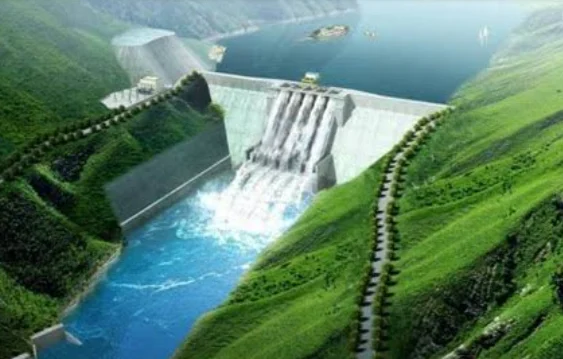Hydroelectric Power in Africa: Potential, Progress, and Challenges
Africa boasts the world's largest untapped hydropower potential, offering a clean and reliable source of energy for a continent grappling with development and electrification challenges.
This article delves into the current state of hydroelectric power in Africa, exploring its potential, ongoing projects, and the key challenges and opportunities this renewable energy source presents.
Hydroelectric Power in Africa: A Growing Source of Energy
Note: The specific capacity of hydropower plants in Africa can vary over time due to factors such as maintenance, upgrades, and changes in water availability. For the most accurate and up-to-date information, please consult recent reports from African governments or energy agencies.
Here's a table providing a general overview of hydropower capacity in Africa, including the capacity of some of the largest plants:
| Hydropower Plant | Capacity (MW) | Location |
|---|---|---|
| Grand Ethiopian Renaissance Dam (Ethiopia) | 6,475 | Blue Nile River |
| Inga Dams (Democratic Republic of Congo) | 14,400 | Congo River |
| Kariba Dam (Zambia/Zimbabwe) | 2,075 | Zambezi River |
| Akosombo Dam (Ghana) | 660 | Volta River |
| Kafue Gorge Dam (Zambia) | 990 | Kafue River |
| Cahora Bassa Dam (Mozambique) | 2,075 | Zambezi River |
| Kainji Dam (Nigeria) | 1,000 | Niger River |
| Aswan High Dam (Egypt) | 1,200 | Nile River |
| Rufiji Falls Dam (Tanzania) | 360 | Rufiji River |
| Masingita Dam (South Africa) | 1,200 | Orange River |
| Total | Approximately 50,000 |
Key Points:
- Grand Ethiopian Renaissance Dam: One of the largest hydropower plants in Africa, the GERD is a significant source of energy for Ethiopia and has been a subject of regional debate.
- Inga Dams: The Inga Dams in the Democratic Republic of Congo have a massive potential for hydropower generation and are being developed in stages.
- Zambezi River: The Zambezi River is home to several large hydropower plants, including Kariba and Cahora Bassa.
- Nile River: The Aswan High Dam on the Nile River is a major source of energy for Egypt.
Untapped Potential:
- Africa holds 17% of the world's theoretical hydropower potential, with a capacity estimated at 600 GW.
- Only 13% of this potential is currently exploited, generating around 160 GW of electricity.
- This underutilization highlights the vast room for growth in the sector.
Current Landscape:
- Hydropower is the leading source of renewable energy in Africa, accounting for over 60% of the continent's total renewable energy generation.
- The largest hydropower producers are Ethiopia, South Africa, the Democratic Republic of Congo, Egypt, and Mozambique.
- Several large-scale projects are underway, including the Grand Ethiopian Renaissance Dam (GERD), the Batoka Gorge Hydroelectric Project, and the Caculo Cabaca Dam.
Benefits:
- Clean and Renewable: Hydropower offers a clean and sustainable source of energy, contributing to a reduction in greenhouse gas emissions and mitigating climate change.
- Reliable and Baseload: Unlike solar and wind energy, hydropower provides baseload power, offering a more stable and reliable source of electricity.
- Economic Development: Hydropower projects can stimulate economic growth by creating jobs, boosting tourism, and providing irrigation for agriculture.
Challenges:
- High Investment Costs: Building large-scale hydropower dams requires significant upfront investment, often hindering development in resource-limited countries.
- Environmental and Social Impacts: Dam construction can cause displacement of communities, disrupt ecosystems, and affect downstream water flow.
- Climate Change: Droughts and erratic rainfall patterns due to climate change can impact hydropower generation, threatening its reliability.
Data and Table:
Here's a table summarizing the hydropower situation in some key African countries:
| Country | Installed Capacity (GW) | Potential Capacity (GW) | % of Electricity from Hydro | Largest Hydropower Plant |
|---|---|---|---|---|
| Ethiopia | 4.2 | 45 | 93% | Grand Ethiopian Renaissance Dam (6,000 MW) |
| South Africa | 13.7 | 15 | 11% | Cahora Bassa Hydroelectric Power Station (2,075 MW) |
| Democratic Republic of Congo | 2.6 | 100 | 90% | Inga I & II Hydroelectric Power Stations (3,548 MW combined) |
| Egypt | 2.8 | 30 | 77% | Aswan High Dam (2,100 MW) |
| Mozambique | 2.0 | 2,400 | 80% | Cahora Bassa Hydroelectric Power Station (2,075 MW) |
The Future of Hydropower in Africa:
Despite the challenges, hydropower remains a crucial aspect of Africa's energy future. Sustainable development of this resource requires:
- Focus on smaller, run-of-the-river projects: These projects have lower environmental and social impacts and can be implemented faster and at lower costs.
- Prioritizing public-private partnerships: Collaboration between governments, private investors, and communities can ensure project viability and share benefits equitably.
- Implementing robust environmental and social safeguards: Mitigating negative impacts and ensuring community involvement are crucial for long-term project success.
- Addressing climate change challenges: Adapting dam infrastructure and operations to cope with changing weather patterns is essential for sustainability.
By responsibly unlocking its hydropower potential, Africa can secure clean, reliable energy for its growing population, fostering economic development and achieving its climate goals.
Additional Notes:
- This article provides a general overview of the topic. Further research is recommended for specific details and analysis of individual projects or countries.
- The table only includes a limited selection of countries. Several other African nations have significant hydropower potential and ongoing projects.
- The data presented is based on publicly available sources and may not be entirely up-to-date.



